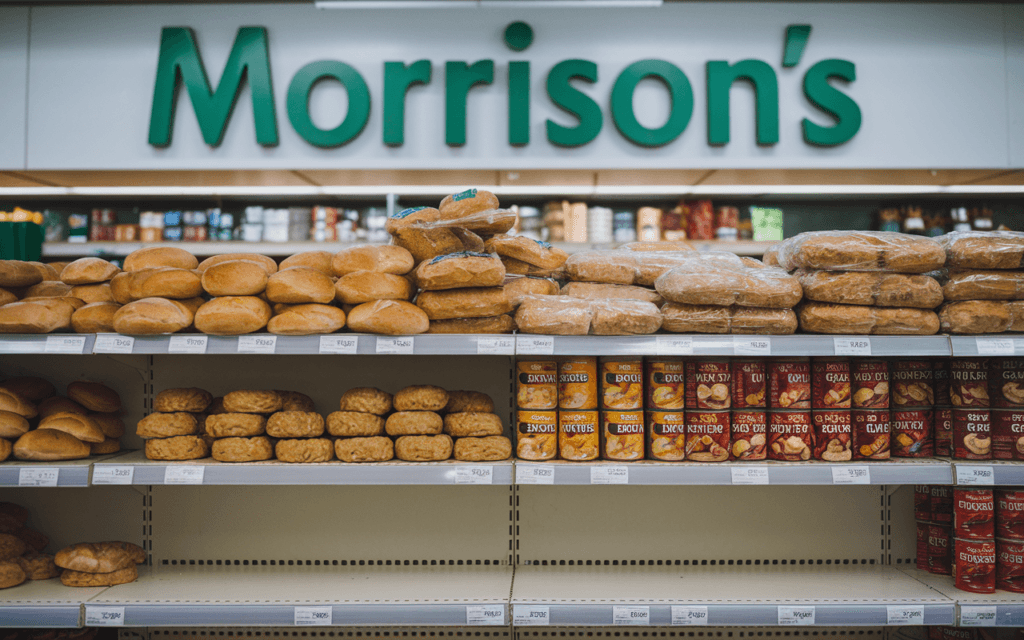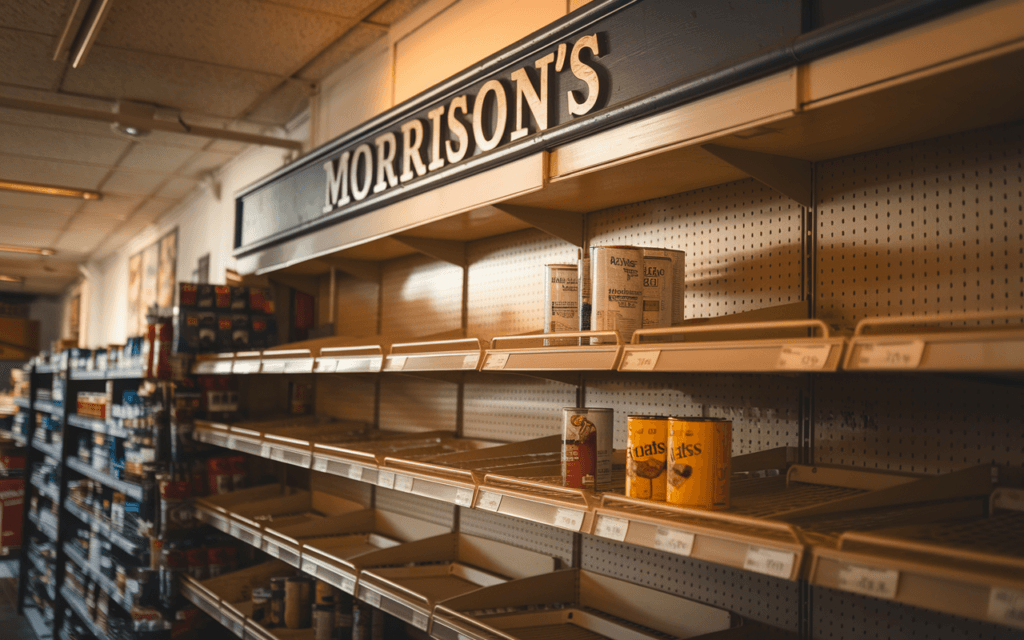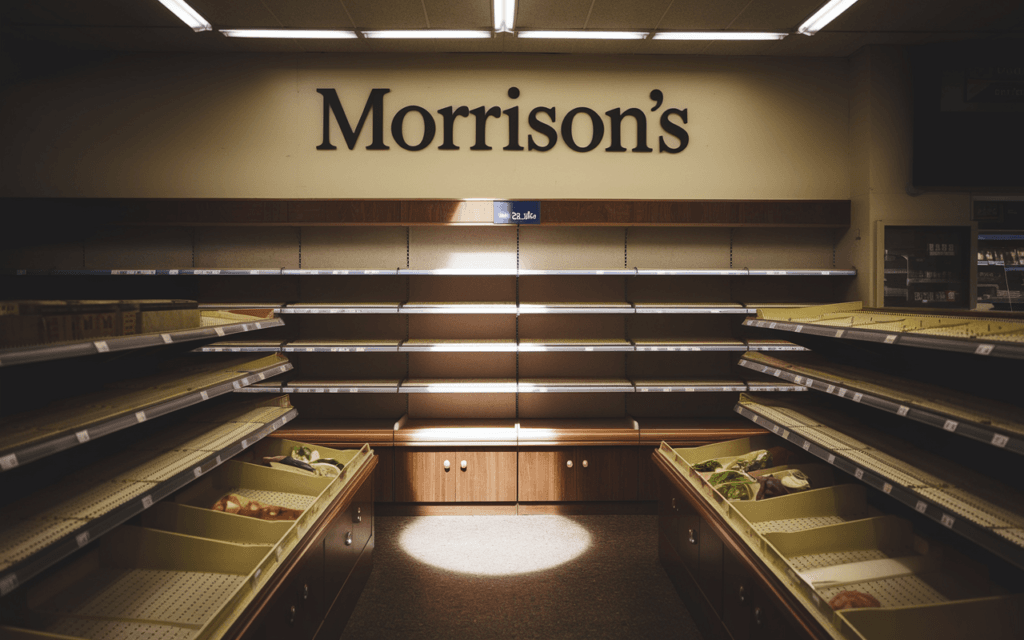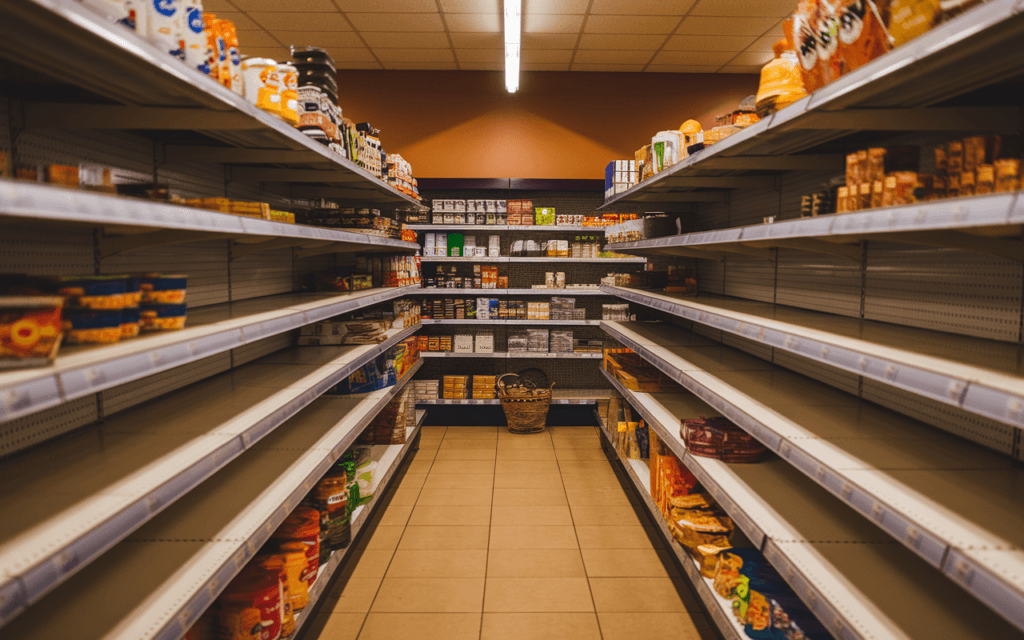Why Food Shortages UK Are Becoming a Reality
From supply chain disruptions to cyberattacks on major supermarkets, food shortages are becoming a recurring issue in the UK. Recent events, such as the ransomware attack on Morrisons’ supply chain software provider, have left shoppers facing empty shelves and limited options. As these challenges persist, it’s clear that planning ahead is essential.
This comprehensive guide will explore:
- The Morrisons food shortage was caused by a cyberattack.
- Broader issues are impacting supermarket supply chains.
- Practical strategies to stock up on long-lasting essentials without overspending.
By the end of this post, you’ll have actionable tips to ensure your household is prepared for future disruptions while saving money and reducing waste.

Understanding the Morrisons Food Shortage UK
What Happened at Morrisons?
Morrisons faced severe stock shortages after a ransomware attack disrupted the systems of its supply chain software provider, Blue Yonder. This attack affected the distribution of fresh produce, leaving shelves bare in many stores. While dried and frozen goods remained unaffected, the absence of fresh fruits, vegetables, and other perishables highlighted the vulnerabilities of modern supply chains.
Who Else Was Affected?
This cyberattack wasn’t isolated to Morrisons. Other major retailers, including Sainsbury’s and Starbucks (US), also experienced disruptions. While Sainsbury’s has since resolved its issues, Morrisons continues to work on restoring normal operations by activating backup systems.
Why Food Shortages UK Are Becoming More Common
Several factors are contributing to frequent food shortages, including:
- Cybersecurity Threats: The Morrisons incident highlights how cyberattacks can cripple essential supply chain systems.
- Weather Disruptions: Unpredictable weather affects crop yields, limiting the availability of fresh produce.
- Labour Shortages: From farming to logistics, staff shortages are slowing down operations.
- Global Shipping Delays: Rising transportation costs and port backlogs exacerbate delays in stocking supermarket shelves.
- Increased Demand: Panic buying during crises leaves shelves empty faster than they can be restocked.
These issues underscore the importance of being prepared for disruptions. By building a well-stocked pantry and adopting smarter shopping habits, you can safeguard your household against future shortages.

Top 10 Essentials to Stock Up On
Stocking up on non-perishable essentials ensures you’re ready for any supply chain disruptions. Here’s what you should prioritise:
1. Canned Goods
- Why Stock Up? Affordable, versatile, and long-lasting.
- Best Picks: canned tomatoes, beans, soups, and proteins like tuna or salmon.
- Shelf life: 2-5 years. Opt for low-sodium varieties for a healthier choice.
2. Dry Pasta and Rice
- Why Stock Up? Staples for filling, budget-friendly meals.
- Best Picks: white rice (longer shelf life than brown), quinoa, couscous, and various pasta types.
- Shelf life: 1-2 years. Store in airtight containers to extend freshness.
3. UHT Milk and Powdered Milk
- Why Stock Up? Long-lasting alternatives to fresh milk.
- Uses: baking, cereals, and hot drinks.
- Shelf Life: UHT milk lasts 6-12 months; powdered milk can last up to 2 years.
4. Cooking Oils
- Why Stock Up? Essential for frying, baking, and flavouring.
- Best Picks: Olive oil for cooking and salads; vegetable oil for frying.
- Shelf life: 1-2 years. Store in cool, dark places to prevent spoilage.
5. Dried Legumes
- Why Stock Up? Cheap, protein-rich, and nutrient-dense.
- Best Picks: lentils, chickpeas, black beans, and split peas.
- Shelf life: 2-3 years. Soak dried beans overnight to reduce cooking time.
6. Frozen Fruits and Vegetables
- Why Stock Up? Nutrient-packed and versatile for cooking or smoothies.
- Tips: Use airtight freezer bags to prevent freezer burn.
7. Baking Supplies
- Why Stock Up? Enables homemade bread, cakes, and other essentials.
- Must-Haves: flour, sugar, yeast, baking powder, and cocoa powder.
- Shelf Life: Flour lasts 6-12 months. Store in sealed bags or freeze for longer storage.
8. Spices and Condiments
- Why Stock Up? Essential for flavouring meals.
- Best Picks: salt, pepper, dried herbs, soy sauce, vinegar, and stock cubes.
- Shelf life: 2-4 years.
9. Long-Lasting Snacks
- Why Stock Up? Convenient for quick energy boosts.
- Best Picks: Granola bars, crackers, and vacuum-sealed biscuits.
- Shelf Life: 6-12 months.
10. Personal Hygiene Products
- Why Stock Up? Non-food essentials like soap and cleaning supplies are equally important.
- Must-Haves: Toilet paper, toothpaste, hand soap, and disinfectants.

How to Save Money While Stocking Up
1. Buy in Bulk
Stores like Costco or Aldi often offer discounts on bulk purchases.
2. Use Cashback and Voucher Apps
Apps like TopCashback or Quidco can help you save on every grocery order. Combine these with in-store offers for maximum savings.
3. Check for Seasonal Discounts
Supermarkets often reduce prices on pantry staples during seasonal sales, such as Black Friday or Christmas promotions.
4. Avoid Impulse Buys
Stick to your shopping list to avoid unnecessary expenses.
5. Rotate Your Stock
Practice “first in, first out” to ensure older items are used before they expire.
How to Store Essentials for Maximum Shelf Life
Proper storage is key to preserving the longevity of your stockpile.
- Airtight Containers: prevent moisture and pests from spoiling dry goods.
- Cool, dark places: ideal for oils, grains, and canned goods.
- Freezing: extend the shelf life of items like flour, butter, and certain fruits.
What to Learn from Morrisons’ Food Shortage UK
Lessons for Consumers
- Diversify Your Shopping Sources: Relying solely on supermarkets can leave you vulnerable during disruptions. Explore local farmers’ markets for fresh produce.
- Monitor News Alerts: Stay updated on supermarket stock levels to plan your shopping trips effectively.
Lessons for Retailers
- Invest in Cybersecurity: The Morrisons incident highlights the need for stronger digital defences to protect supply chain systems.
- Develop Backup Systems: Quick activation of backups can minimise disruptions during a crisis.

FAQs
1. What’s the best way to prepare for food shortages?
Start by stocking up on non-perishables like canned goods, pasta, and cooking oils. Build your inventory gradually, focusing on versatile and long-lasting items.
2. How can I save money while preparing for shortages?
Use cashback apps, shop during sales, and buy in bulk at discount retailers like Lidl or Costco. Avoid overbuying to prevent waste.
3. What should I avoid stockpiling?
Avoid items with short shelf lives, such as fresh fruits, dairy, and meats, unless you have adequate freezing capacity.
4. How do I store food to maximise its shelf life?
Use airtight containers for dry goods, freeze perishable items, and keep oils and canned goods in cool, dark places.
5. Are food shortages likely to continue?
With ongoing global challenges like cybersecurity and climate change, periodic food shortages are expected. Staying prepared is key to navigating these uncertainties.
Conclusion: Stay Prepared Without Overspending
The Morrisons food shortage and broader supply chain issues are a wake-up call for consumers. By stocking up on long-lasting essentials and adopting smarter shopping habits, you can avoid last-minute panic and rising prices. Focus on versatile, affordable items that meet your family’s needs, and always stay informed about potential disruptions.
Call to Action
Looking for more money-saving tips and shopping hacks? Visit Money Savvy UK for expert advice on budgeting, cashback apps, and preparing for emergencies. Don’t forget to share your own stocking-up strategies in the comments!
Posts other people are reading
- Maximizing Savings with Cashback Apps
- How to Slash Your Grocery Bill by 30%
- Best Apps to Turn Receipts into Cash
External Links


